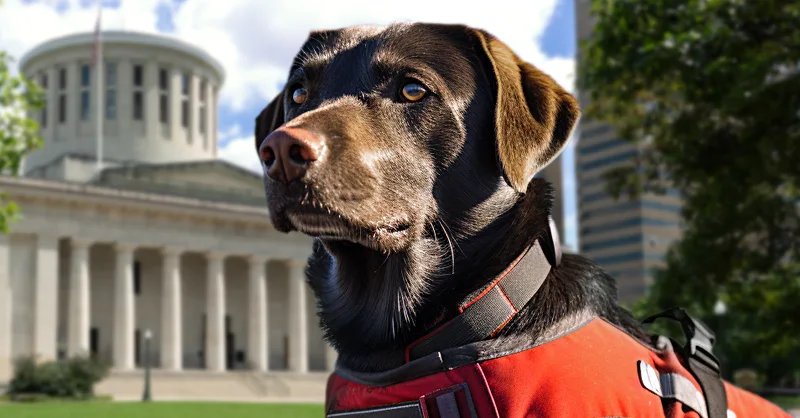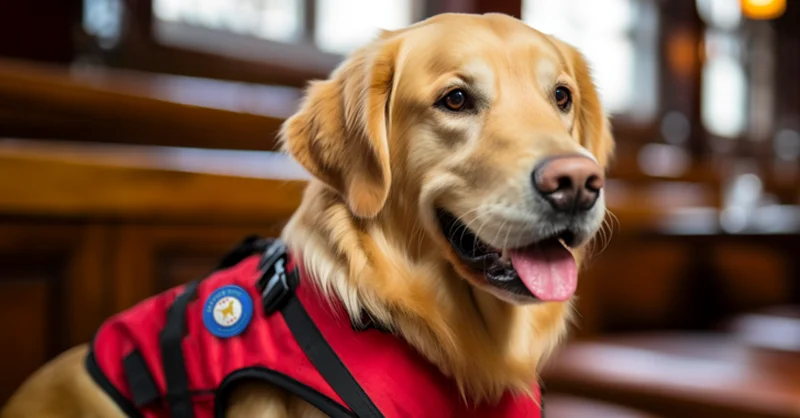Archive for the ‘Service Dog Tips’ Category
Service dogs are a lifeline for countless individuals with physical and psychological disorders. Acknowledging their critical role, Ohio has established regulations that safeguard the rights of service dog handlers.
In the Buckeye State, service dogs have the liberty to access public zones where animals are generally prohibited. Furthermore, they are allowed in housing units where ordinary pets might not be accepted.
In this detailed guide, we’ll outline the rights of service dogs in Ohio, the eligibility criteria for handlers, and what the registration process means.
Who Qualifies to Handle a Service Dog in Ohio?Service dogs transcend the realm of traditional pets. They’re designated assistance animals serving individuals with disabilities. As defined by the Americans with Disabilities Act (ADA), a person with a disability is someone:
“who has a physical or mental impairment that substantially limits one or more major life activities.”
To be eligible in Ohio, the handler should be diagnosed with a physical or mental health disability, and the dog must be trained – either by the handler or a professional – to carry out specific tasks associated with the handler’s disability.
Such skilled canines perform jobs like guiding blind people, offering therapeutic support for psychological disorders, or aiding mobility by pulling wheelchairs. Dogs that assist with mental health-related disabilities are typically called psychiatric service dogs.
Understanding Service Dog Registration in OhioIs a Service Dog Registration necessary? No. In Ohio, there’s no legal obligation to register service dogs. While there’s no requirement for proof of registration to ascertain your service dog’s status, many handlers opt for voluntary database registrations to attain ID cards.
Handlers often employ badges like vests, ID cards, or certificates to underscore their dog’s specialized status. These markers play a pivotal role in distinguishing a regular pet from a trained service dog, reducing unwarranted interrogations in areas usually off-bounds to pets, and ensuring the dog remains undisturbed.
However, it’s crucial to discern that these items aren’t official proof of a dog’s service status. And nobody should require these accessories for entry. They serve mainly for the handler’s convenience when facing the public.
In Ohio, if the role of the service dog isn’t instantly recognizable, third parties are limited to two questions:
Is this dog required for a disability? What job or task has the dog been trained to execute?Once these questions are answered to everyone’s satisfaction, an Ohio service dog handler should be accorded unhindered access to public locales without necessitating any documentation.
For those inclined to register their service dog and obtain an ID card, Service Dog Certifications (SDC) is a sought-after choice.
Here’s the step-by-step process to enroll a service dog with SDC in Ohio:
Verify your status as a service dog handler.Input details of the service dog and handler.
Provide your email for communications and digital ID dispatch.
Upload a current picture of your service dog.
Explore and select auxiliary items like additional ID cards, tags, vests, etc.
Ohio Service Dog Training Standards
To earn the title of a service dog, meticulous training tailored to their designated tasks is imperative. They must also exhibit exemplary demeanor and restraint in public environments.
The three main avenues for training include:
Adopting an already-trained service dog. Engaging a professional for customized training. Undertaking self-training which also fosters a profound bond between the handler and canine. But only consider this if you’re already adept at training a dog. Laws About Service Dogs in OhioBeyond the federal provisions of the ADA, Ohio has its own set of statutes that fortify the rights of service dog handlers.
Ohio law, specifically ORC 955.43, permits persons with disabilities to be accompanied by their service dogs in all public places. However, there are some quirks in Ohio law that are not consistent with federal ADA rules. For example, the Ohio definition of “assistance dog” only covers a person who is blind, deaf or hard of hearing, or mobility impaired.
However, ADA rules likely preempt the Ohio rules. That means, for example, the Ohio requirement that an “assistance dog” be leashed is probably overruled by the more flexible ADA standard. Same with the Ohio requirement that the dog be trained by a nonprofit special agency. The ADA permits the training of service dogs with the help of a professional or without any outside assistance. Psychiatric service dogs are also recognized by the ADA and, therefore, in Ohio, even though the Ohio statute neglects to mention them.
In Ohio, falsely portraying a pet as a service animal is a violation that can lead to penalties. Upholding integrity and honesty is fundamental in cultivating mutual trust between the general public and legitimate service dog handlers.
Businesses can face lawsuits for not following service dog guidelines. In one case, a disabled veteran settled a lawsuit against a health services provider in Cleveland after staff allegedly refused to perform an examination because of the veteran’s service dog.
Ohio’s Service Dog UpdatesRecently, in Ohio, the U.S. Attorney recognized the observance of Service Dog Awareness Week and reminded the public of the valuable contributions that service animals make. The Attorney’s Office highlighted the federal laws that protect these animals and those who use them.
ConclusionOhio is a state that is committed to the rights of service dog owners, ensuring that handlers and their canine partners are treated with the dignity and privileges they are entitled to. If you’re a service dog handler in Ohio, you can be confident about your rights whenever you’re in public.
Service dogs provide invaluable assistance to individuals grappling with physical and mental health challenges. Taking note of their paramount importance, New Jersey has enacted laws to uphold the rights of service dog handlers.
In the Garden State, service dogs enjoy unrestricted access to public spaces where animals might typically be prohibited. They’re also welcomed in residences where pets might not generally be allowed.
In this comprehensive guide, we’ll cover what rights service dogs have in New Jersey, how to qualify for one, and whether registration is required.
Who’s eligible to handle a service dog in New Jersey?Service dogs are not ordinary pets; they are legally recognized assistance animals for individuals with disabilities. The Americans with Disabilities Act (ADA) states that a person with a disability is:
“who has a physical or mental impairment that substantially limits one or more major life activities.”
To qualify, the handler must be living with a physical or mental health disability. The service dog, whether trained personally or by a professional, should be equipped to perform a specific task that assists their handler’s disability.
These specialized dogs can guide visually impaired people, offer deep pressure therapy for psychiatric challenges, or even assist with mobility by pulling wheelchairs. When addressing mental or intellectual disabilities, they’re often dubbed as psychiatric service dogs.
Navigating Service Dog Registration in New JerseyIs service dog registration mandatory? No, New Jersey doesn’t mandate a formal registration process for service dogs. No one can ask for proof of registration to verify your service dog. Nonetheless, many handlers find it beneficial to register their service dogs in voluntary databases to procure ID cards.
Those with service dogs often use markers like vests, ID cards, and certificates to delineate their dog’s unique role. Such identifiers are instrumental in highlighting the distinction between a regular pet and a specially trained service dog. It aids in preventing unwanted questions in places typically off-limits to pets and safeguards the dog from unnecessary disturbances.
However, remember that these accessories shouldn’t be mistaken for official service dog verification. No one should demand these items as an entry prerequisite. They’re essentially for the handler’s benefit only.
In New Jersey, when the purpose of the service dog isn’t immediately apparent, third parties are permitted to pose two questions:
Is this a service dog required because of a disability? What work or task has the dog been trained to perform?Upon answering these queries satisfactorily, a New Jersey service dog handler should be provided reasonable accommodation in public spaces without any documentation.
For those keen on registering their service dog and securing an ID card, Service Dog Certifications (SDC) is a popular option.
Here’s a quick walkthrough to register a service dog with SDC in New Jersey:
Validate your status as a service dog owner.Register the service dog and owner’s details.
Share your email address for correspondence and digital ID card delivery.
Upload a recent snap of your service dog.
Browse and select optional accessories like additional IDs, collar tags, vests, etc.
Training Essentials for Service Dogs in New Jersey
For a dog to be labeled as a service dog, specific training tailored to their assigned tasks is non-negotiable. They should also epitomize impeccable behavior and control in public places.
Three prevalent approaches to training are:
Opting for a trained service dog. Employing a seasoned professional for training. DIY training, which also cultivates an enriched bond between the handler and the dog. However, dive into this only if you’re well-versed with the requisites of training. New Jersey State Laws and RegulationsWhile the federal ADA provides overarching support, New Jersey’s statutes, known as the New Jersey Law Against Discrimination, help to reinforce service dog handler rights.
Like the ADA, the New Jersey statute permits people with disabilities to bring their service dog to all public facilities. Note that in New Jersey, a service or guide dog trainer, while engaged in the actual training process, has the same rights and privileges with respect to access to public facilities.
It’s essential to highlight that misrepresenting a pet as a service animal in New Jersey is morally reprehensible and can subject offenders to fines. Integrity and transparency are paramount in fostering trust between the public and true service dog owners.
Latest in New Jersey’s Service Dog ArenaA video recently went viral of a feel-good moment involving a service dog. A service dog named Justin stole the spotlight at a graduation ceremony at Seton Hall when he received a diploma. The attendees cheered as Justin accepted the diploma, recognizing his commitment to his owner, having accompanied her to all her classes.
Final ThoughtsBy following this guide, residents of New Jersey can better understand and navigate the world of service dogs in the state, ensuring that both handlers and dogs receive the rights and respect they deserve.
Many people feel they might need a service dog in their lives but are afraid of the costs. Indeed, a fully trained service dog purchased from a reputable organization can cost tens of thousands of dollars. The high cost of a trained service dog leads many to wonder: “How can I get a service dog for free?”
The good news is that while costs are unavoidable, there are ways you can significantly reduce the cost of service dog ownership. This article will guide you on how you can acquire or train a service dog without a hefty price tag while still adhering to the regulations set out by the Americans with Disabilities Act (ADA).
Training a Service Dog YourselfThe ADA does not require service dogs to be trained by a third-party professional or organization. Thus, individuals can train their service dogs. This is more common than people think. Many handlers choose this route and develop a deeper bond with their dog in the process.
If you are not experienced with dog training, however, it’s wise to seek the help of a professional. Self-training a service dog takes major effort and commitment, and has to be done the right way.
A properly trained service dog is essential for the safety and well-being of not only the handler, but also of the service dog and the public at large.
The essential elements of training a service dog are:
Basic Obedience Training: Before specialized training, the dog must master basic commands such as sit, stay, come, heel, and down. Task-specific Training: This involves training your dog to perform tasks directly related to your disability, like retrieving items, providing balance, or alerting to certain medical conditions. Public Access Training: Your dog should behave impeccably in various environments, from busy streets to quiet libraries. Service dogs should be able to pass a public access test with flying colors. Lowering the Cost of TrainingTraining a dog yourself can be overwhelming. Fortunately, there are resources available to help:
Hire a Professional Trainer: While hiring a trainer obviously incurs costs, it can be significantly less than purchasing a trained service dog. A trainer can also ensure your dog doesn’t get on the wrong track, which can lead to more time and investment to correct later. Seek trainers with experience in service dog training. Training Videos & Books: There’s a wealth of information online and in libraries. Websites like YouTube have numerous tutorials on service dog training. Books can provide in-depth guidance and step-by-step methods. Local Support Groups: Many areas have local service dog groups or organizations that offer support and training advice. Adopting a Service DogMost people are not in a position to adopt a fully trained service dog because of the high cost. Given the time and effort required to train a service dog, it’s no wonder they are very expensive to purchase.
You can, however, adopt a dog yourself to train. If you are choosing a dog to train yourself, it’s important to find a suitable candidate. The dog should be of the right age, temperament, and health.
Some dogs from shelters and rescues have the potential to be trained as service dogs. Adopting is often less expensive than purchasing a dog from a breeder. It’s essential, however, to ensure the dog has the right temperament and capabilities for the job.
If you plan to use a dog you already own, be realistic about what your dog can and can’t do. A service dog must be able to reliably complete tasks in a wide range of environments.
Avoiding Service Dog FeesOne popular misconception about service dogs is that you need to pay to register them. Many people also think IDs, tags, and vests are also mandatory. This is not the case.
The ADA gives rights to service dog handlers regardless of whether they have these items. If you’re on a tight budget, you can forgo specialized service dog gear. However, most service dog owners use these items as visual aids to identify that service dogs are instrumental in facilitating undisturbed access in public.
Remember, there is no special fee or mandatory documents or accessories you need to buy in order to qualify for a service dog. If you’re on a tight budget, spend your resources on the most important aspect: proper training.
Proper, personalized training is the most important aspect of making a dog become a service dog. Funding and Financial AssistanceFor those who need assistance with the financial aspects of acquiring or training a service dog, there are options:
Insurance: Currently, many health insurance plans, including Medicare and Medicaid, do not cover the costs associated with service dogs. However, it’s always a good idea to check with your specific insurance provider. Grants: Some non-profit organizations and foundations offer grants for individuals needing a service dog. Crowdfunding: Many people have turned to platforms like GoFundMe to raise funds for their service dog needs. Further Tips for Lowering the Cost of Service Dog OwnershipNetwork with Service Dog Owners: Join local or online groups to meet service dog owners. They can offer insights, share resources, or even provide hands-on assistance.
DIY Equipment: Some equipment, like vests or harnesses, can be made at home or adapted from standard dog equipment rather than purchasing specialized – and often more expensive – dog gear.
Veterinary Schools: Some veterinary schools or colleges offer discounted medical services, which can help reduce the overall cost of maintaining a service dog.
Seek Donations of Supplies: Local pet stores or businesses might be willing to donate supplies like dog food, toys, or even training gear.
Stay Updated: Regularly check with service dog organizations for any new grants, programs, or opportunities that might arise. The landscape constantly evolves, and new funding or assistance avenues might become available.
Start Small: If you’re feeling overwhelmed, remember that every step, no matter how small, brings you closer to your goal. Even if it’s just reading a chapter from a training book or teaching your dog a basic command, progress is progress.
Owning and training a service dog on a limited budget undoubtedly presents challenges, but with resourcefulness, determination, and community support, it’s achievable.
ConclusionWhile the journey to acquiring a service dog can be daunting, especially when faced with financial constraints, there are viable paths to achieving this without breaking the bank.
Whether you decide to train a service dog yourself or seek financial assistance, the companionship and assistance provided by these incredible animals make the effort worth it.







